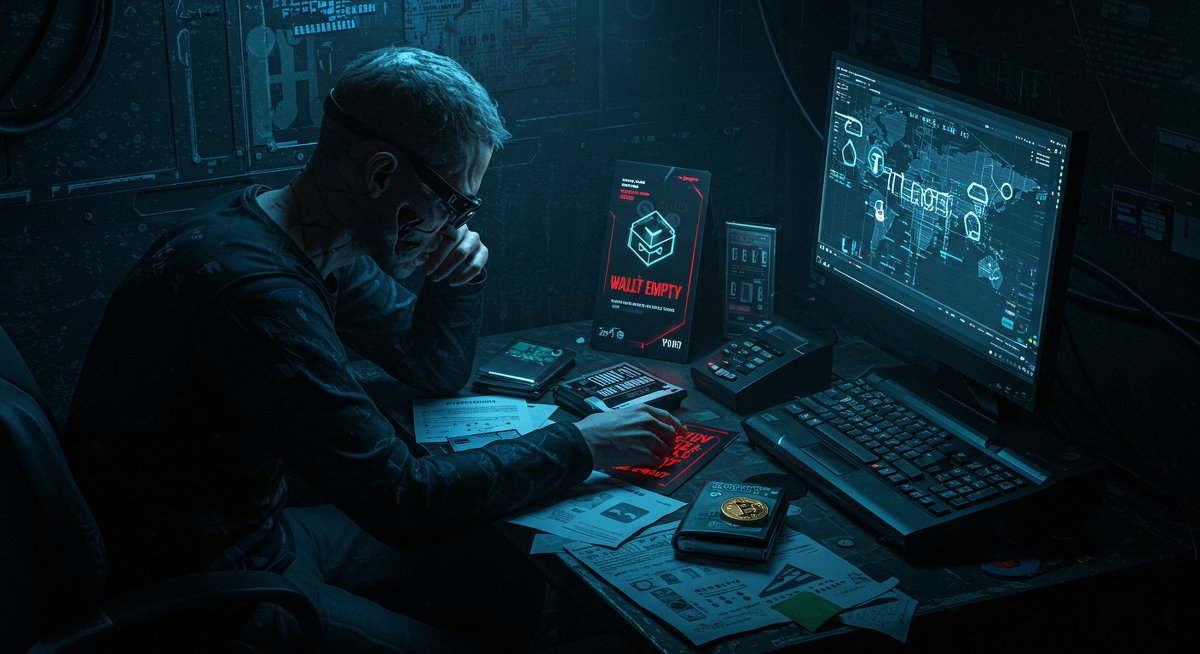That Reddit Post That Got Me Thinking
So, I was scrolling through r/Bitcoin the other day, and I saw a post that really stuck with me. The title was simple: “Isn’t it kind of insane that one forgotten passphrase can erase millions... forever?” It’s a valid point, right? In a world where we back up everything from our photos to our documents, the idea that a single slip-up can lead to irreversible financial loss is pretty mind-blowing.
The post itself was short and sweet, highlighting how traditional assets like stocks and bank accounts have safeguards in place, while Bitcoin offers no such safety net. Forget your passphrase, and it’s game over. No recovery options, no “forgot password” button, just gone. This isn't financial advice, but it’s definitely something to think about, and sparked a ton of comments and upvotes, which made me realize I wasn't the only one who felt like that.
It got me thinking about the implications of this, especially for those of us trading crypto internationally. Different countries have different regulations, different levels of access to resources, and different cultural attitudes toward risk. What might be a minor inconvenience for someone in the US could be a major crisis for someone in, say, Vietnam or Argentina. The Bitcoin price is volatile enough, and losing your savings due to a forgotten key is like losing everything.

The Brutal Reality of Bitcoin Key Management
Okay, so let's break down what actually happens when you lose your Bitcoin passphrase. Unlike your online banking login or email password, there's no central authority to appeal to. Bitcoin is decentralized, meaning there's no "Bitcoin Inc." to call and ask for help. Your passphrase, or private key, is the only thing that gives you access to your Bitcoin. Lose it, and you lose access.
Think of it like this: imagine you have a safe deposit box filled with gold bars. The only key to that box is a piece of paper you keep in your wallet. One day, you lose your wallet. The gold bars are still in the box, but you can't get to them. No bank employee can help you, no locksmith can pick the lock. The gold is effectively lost forever.
Now, apply that same scenario to Bitcoin. Your Bitcoin is stored on the blockchain, but your private key is what allows you to move it. Without that key, your Bitcoin is just sitting there, inaccessible to anyone, including you. It's a harsh reality, and it's one that many people have learned the hard way. There are countless stories online of people who lost their Bitcoin fortunes due to forgotten passphrases, lost hard drives, or compromised wallets. These stories aren't just cautionary tales; they're a stark reminder of the importance of responsible key management. The current Bitcoin price can be tempting to get involved with, but you need to take key security seriously. The last thing you need is to lose everything.
What This Means for YOU and Your Crypto Stash
So, what does all this mean for you, the average crypto trader? Well, first and foremost, it means taking your security seriously. Don't treat your Bitcoin passphrase like just another password. It's the key to your financial kingdom, and you need to protect it accordingly. That's what this analysis of the Bitcoin price is really about.
Here's what I'd recommend, based on what I've seen work for others and what I do myself. First, use a strong, unique passphrase. Don't use a password you use for other accounts, and make sure it's complex enough to resist brute-force attacks. Second, store your passphrase securely. Don't keep it on your computer or phone, where it could be compromised by malware or hackers. Instead, consider using a hardware wallet, which stores your passphrase offline.
Alternatively, you can use a paper wallet, which is simply a piece of paper with your passphrase written on it. Store this paper in a safe place, like a safe deposit box or a fireproof safe. Finally, and this is crucial, make a backup of your passphrase. Store this backup in a separate location from your primary passphrase. That way, if something happens to your primary passphrase, you still have a way to access your Bitcoin.
Remember, the goal is to create multiple layers of security. The more difficult you make it for someone to steal your Bitcoin, the less likely they are to try. The Bitcoin price may fluctuate, but a lost key is forever.
The Stuff Nobody Talks About: The Dark Side of Self-Custody
Okay, let's get real for a minute. While self-custody of your Bitcoin offers unparalleled control and security, it also comes with a dark side that nobody really wants to talk about. I'm not talking about the Bitcoin price volatility, but about the risk of complete loss.
I'm talking about the possibility of losing your Bitcoin due to your own mistakes. We've already discussed forgotten passphrases, but there are other ways to screw up. You could accidentally send your Bitcoin to the wrong address, you could fall victim to a phishing scam, or you could simply make a mistake when setting up your wallet. The point is, self-custody puts the responsibility squarely on your shoulders. There's no one to blame but yourself if something goes wrong.
Now, I'm not saying this to scare you. Self-custody is still the best way to protect your Bitcoin. But it's important to be aware of the risks involved and to take steps to mitigate them. Educate yourself about common scams and security vulnerabilities. Double-check every transaction before you send it. And most importantly, don't be afraid to ask for help. There are plenty of resources available online and in the Bitcoin community to help you navigate the world of self-custody. Plus, if you are not up to date with the latest Bitcoin price, you can make a mistake when sending, receiving, or converting your crypto.
If You're Trading Bitcoin from Outside the US: Extra Things to Keep In Mind
If you're trading Bitcoin from outside the US, there are a few extra things you need to keep in mind. Depending on where you live, you may be subject to different regulations, taxes, and security risks. Regulations vary a lot, which can heavily affect the Bitcoin price.
For example, some countries have banned Bitcoin outright, while others have embraced it. Before you start trading, make sure you understand the legal status of Bitcoin in your country. You don't want to accidentally break the law and face fines or even imprisonment. Taxes are another important consideration. Depending on your country's tax laws, you may be required to pay taxes on your Bitcoin profits. Consult with a tax professional to understand your obligations.
Security risks can also vary depending on your location. In some countries, internet access may be unreliable, making it difficult to trade Bitcoin safely. In others, government surveillance may be a concern. Take steps to protect your privacy and security when trading Bitcoin from abroad. Use a VPN to encrypt your internet traffic, and consider using a privacy-focused wallet. Also, make sure you are using an exchange that follows local laws and regulations, and offers support in your language.

Actually Doing This Stuff: A Step-by-Step Guide to Bitcoin Security
Okay, so how do you actually implement all this security stuff? Here's a step-by-step guide to securing your Bitcoin, designed for international traders.
Step 1: Choose a secure wallet. There are many different Bitcoin wallets to choose from, each with its own strengths and weaknesses. Consider using a hardware wallet for maximum security. Popular options include Ledger and Trezor. These wallets store your private keys offline, making them resistant to hacking.
Step 2: Create a strong passphrase. Use a password manager to generate a strong, unique passphrase for your wallet. Don't use a password you use for other accounts, and make sure it's at least 12 characters long. A truly random passphrase that is hard to guess is ideal.
Step 3: Back up your passphrase. Most wallets will give you a recovery phrase when you set them up. This phrase is a series of 12 or 24 words that can be used to recover your wallet if you lose your passphrase. Write down this phrase on a piece of paper and store it in a safe place. Consider storing multiple backups in different locations.
Step 4: Enable two-factor authentication (2FA). 2FA adds an extra layer of security to your wallet by requiring you to enter a code from your phone in addition to your passphrase. This makes it much harder for hackers to access your Bitcoin, even if they have your passphrase. Use an authenticator app like Google Authenticator or Authy, rather than SMS-based 2FA, which is vulnerable to SIM swapping attacks. Also, regularly check the Bitcoin price to catch any suspicious activity.
My Take on All This: It's Worth the Effort to Be Safe With Bitcoin
So, here's my take on all this. Securing your Bitcoin can seem like a hassle, especially when you're just starting out. But trust me, it's worth the effort. The peace of mind that comes with knowing your Bitcoin is safe and secure is priceless.
Look, I'm not trying to scare you. Bitcoin is still a relatively new technology, and there are risks involved. But by taking the necessary precautions, you can significantly reduce those risks and protect your investment. The current Bitcoin price makes it even more tempting to invest, but security should be a priority.
Maybe I'm wrong, but I believe that Bitcoin is the future of finance. And if you're going to be a part of that future, you need to be responsible and take your security seriously. Don't be the person who loses their Bitcoin fortune due to a forgotten passphrase. Take control of your security and protect your investment.